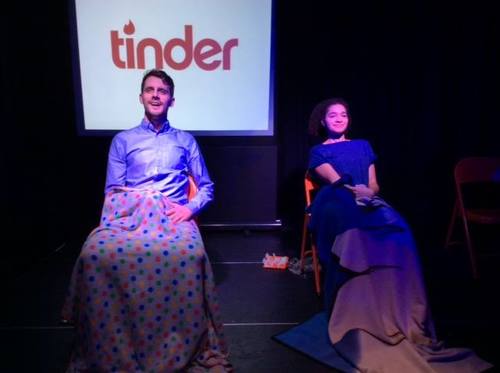You have no items in your cart. Want to get some nice things?
Go shopping
Has the digital era of Facebook and Tinder destroyed the game of love? Does love exist in 2016? Australian writer Michelle Sewell walks us through that dark alley in her exploration of what now constitutes love and what underpins our moral compass in our iPhone-obsessed age.
Love, Sex and Apps is a double-bill of two multimedia plays, The Tinder Game and Border Control. Award-winning playwright Sewell takes a brutally honest look at the way we communicate and relate to others in our digital world. Social media apps, it reminds us, are simply a projection of ourselves: when we can pick the most flattering photograph to show to the world and play down our “baggage” to seem as appealing as a Disney prince, can we really trust anything we are told anymore? After all, when you are sat at home in your pyjamas, you have the time to build up the confidence to be as charismatic or flirtatious as you wish – but when you’re stood face-to-face and your body language gives away your dishonesty, that changes the game.
Put briefly, Border Control makes us question the definition of love. When you treat your Facebook page as nothing more than your journal – stating in fact how long you’ve been in relationship, including your mini-break-ups for every little quarrel, and even sharing your affectionate nicknames – is this a legitimate real-life representation of a relationship or simply a couple of twenty-somethings playing house? Olivia Onyehara, Geoffrey Wolfe and Jay Oliver Yip portray three immigration officers reviewing Mrs Jasmine Frost’s application to stay in the country by dissecting her relationship with now-husband Edward Frost through emails, text messages, Facebook quotes and Skype conversations. Onyehara represents an optimistic view of their union; Wolfe, in a flirtatious manner, displays a belief that theirs is more of a physical attraction; and Yip flat-out disbelieves the authenticity of the entire relationship. Each cast member displays the different views that obtain in today’s dating world in a subtle, cleverly orchestrated manner.
Visually, Border Control appears cold and unnerving. As three officials choose the future of two people’s lives based on the body language they interpret in a photo – unaware of anything else the couple could be battling in their lives during their stressful student days – it’s eye-opening to see how dismissive our society has become. In the end Jasmine is rejected with no chance of reapplying, proving that lack of faith and the emptiness of lust is what reigns supreme over hopefulness and true love.
On the contrasting side of the spectrum, The Tinder Game is a clear-cut demonstration of using a dating app. With the “live in the now” mentality and a closet full of secrets aesthetically, The Tinder Game feels like a student rave meets Studio 54. Sewell – with the help of Onyehara, Wolfe and Yip – shows how Tinder can destroy the social anxiety courting can provide, but the one thing you can’t escape is vulnerability. The acting skills definitely make you think about your own interactions n romantic situations. For example, Onyehara’s line “makes me think how alone we really are” is spot on to describe the dating app era. After all, how well do you get to know someone on Tinder? You can’t fall in love based on a profile picture. As Onyehara’s and Wolfe’s characters sit on stage on a cyber-date, sex toys and all, they pretend they are having sex on a beach somewhere exotic instead of enduring a cold winter’s night on the District Line. It’s in that moment you realise what the dating app has created: a fantasy, where you can be anyone you want online. For some, it’s a matter of sexually comfortable PhD students cracking jokes about how often they masturbate with an emoji here and there. The end of the play takes a dark and bitter turn, exemplified in the evocative utterances “it’s shopping for sex, this app” and “romanticism is dead”. It took a long time to clearly get to the bottom of what Tinder has done to our mentalities, but when Sewell does finally arrive at this conclusion it does truly leave us in a much-needed state of clarity.
Love, Sex and Apps: Border Control and The Tinder Game is showing at the Bread and Roses Theatre until December 1. Tickets are £12 (£10 concessions),

About B.L. Sherrington
B. L. Sherrington is an aspiring novelist. In between writing short stories and reviews, Sherrington is penning a science fiction/fantasy novel and co-writing a play. An experienced journalist, Sherrington has previously written for Neon, The Metropolist, DEUX HOMMES and SANT Magazine. Previously a student at Manchester Metropolitan University, Sherrington is preparing to return to education at the Open University to study Creative Writing.





100% Necessary Information! It’s really good for me. Thank’s Admis.
100% Necessary Information! It’s really helpful information for me. Thank’s Admin.
thanks for your wonderful post,Here is JSC Result 2017 bangladesh all education borad.
JSC Result 2017